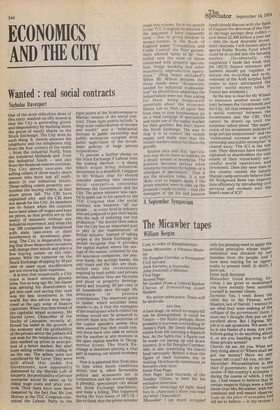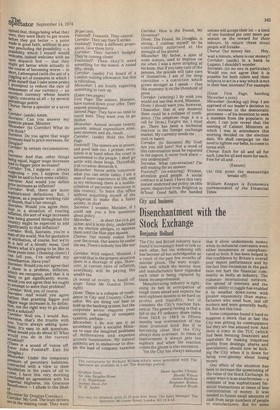A September Symposium
The Micawber tapes
William Keegan
Cast, in order of disappearance: Denis Micawber, a Finance Minister Sir Douglas Corridor, a Permanent Civil Servant Jack Socrates, a Journalist John Foot staff, a Minister
First Page Second Page
Mr Gordon Dives, a Central Banker Chorus of Diminishing Asset Holders
No action takes place. There will be intervals.
Act One A bare stage, on which an empty till can be distinguished. It could be Venice — the Rialto perhaps. More probably it is a room overlooking St James's Park. Mr Denis Micawber enters from left carrying a dispatch box. As the lights rise, a figure can be made out pacing up and down (centre). It is Sir Douglas Corridor, who is also scratching his (own) head nervously. Behind a door the figure of Jack Socrates sits in waiting. He is heavily suntanned, as becomes clear later.
Enter First Page.
First Page: Jack Socrates, of the Sunday Citizen, is here for his exclusive interview.
Corridor: (wincing) All right. Send him in. (Anxiously) Have you read my brief, Chancellor?
Micawber: I am much occupied with the pressing need to apply the socialist principles whose implementation was dictated by our mandate from the people, and I have been waiting for an opportunity to present itself. In short, I
have not. • Enter Jack Socrates
Micawber: Good morning, Socrates. I am given to understand you have recently been sunning yourself in warmer climes.
,Socrates: Yes. I went down the other day to the Piraeus, with Maurice, son of Harold. I wanted to see what they were making of the collapse of the government there. must say I thought they put on an excellent show. But I digress. MY job is to ask questions. We seem to be in one Hades of a mess. Are you fellows going to do anything about it, or are you handing over to all these private armies?
Chorus: Ah me. Ah you. What are they doing about it? Where shall we put our money? Have we anY money left to put? Ah you. Ah me. Micawber: Procrastination is the thief of government. In my recent review of the country's accounts — during the course of which, I rriY say, I had reason to believe that in certain respects things were a little better than Mrs Micawber, with her continual and well-meant observations on the price of avocados had led me to believe — in my review I
°Pined that, things being what they were, they were likely to get worse before they got better — a point made in good faith, without in any way precluding the possibility — a Possibility which I myself would welcome, indeed welcome with an °Pen dispatch box — that they might get better while actually in the course of becoming worse — in short, I attempted (with the aid of a Juggling act of measures in which I Pride myself that I take some pride) I attempted to reduce the rate of debasement of our currency — an excellent currency whose health rightly concerns us all — by several Percentage points. Chorus: Never a spender or a saver be.
Corridor: (aside) Amen. Socrates: Can you answer my question please, Minister. Micawber: (to Corridor) What do You think?
Socrates: Do you agree that wage increases lead to price increases, Sir Douglas?
Corridor: In certain circumstances, Yes.
Socrates: And that, other things being equal, bigger wage increases lead to bigger price increases? Corridor: Yes, I suppose — always suPPosing — yes, I suppose that Might be said to have some validity. Socrates: And would you define Price increases as inflation? Corridor: Well, there are more sophisticated definitions. But, I suPPose, as a popular working rule of thumb, that's fair enough. Socrates: Would you agree then, that in a situation of roaring inflation, the sort of wage increases
now being granted throughout the country might be expected to add
significantly to that inflation? Corridor: Well, Socrates, you're a
Man of the world. Not for quotation or attribution, of course, but we're
in a hell of a bloody mess. God knows what it's going to be like in three years time. I (leaning closer) I can tell you, I've ordered my Wheelbarrow. Have you? Socrates: Would you not agree that if there is a problem, inflation,
which we recognise, and that it is likely to get significantly worse, Would you not agree that we ought to attempt to solve that problem?
Corridor: Well, yes, of course. ,Socrates: And would you agree
ozther that granting bigger and bigger wage increases is, by defini
tion, not the right way to go about such a solution? Corridor: Well yes, I would. But, Socrates, that's the trouble with You. You're always asking questions. It's easy to ask questions. What would you do about it? What Would you do in the current situation?
(There is a sound of voices off.
Enter John Footstaff. Exit Sir Douglas) micawber: Under the temporary Pressure of pecuniary liabilities, contracted with a view to their liquidation in the years of oil to
come, I have this very morning F.encluded an agreement with his
LrnPerial Highness, his Gracious rieneficence — I allude to the Shah of .
(Reenter Sir Douglas -Corridor) Lorridor: My God. The train drivers
are in the waiting room. They want 30 per cent.
Footstaff: Forsooth. They cannot. Corridor: They say they'll strike. Footstaff: Verily a different proposition. Give them forty.
Corridor: They haven't budged. They're coming closer. Footstaff: Then they'll need something for the nonce. A round fifty, sirrah.
Corridor: (aside) I've heard of a London waiting allowance, but this is ridiculous.
Micawber: I am hourly expecting something to turn up.
(Enter two pages) •
First Page: The miners, Minister, have turned down your offer. They request attendance.
Second Page: They have no time to travel here. They want you to go thither.
Micawber: Annual income twenty pounds, annual expenditure nineteen nineteen and six, result. . Corridor: (aside) Hold the front Page.
Footstaff: The miners are in power, and good lads too. I prithee, revolution is at hand when the court is summoned to the people. I shall go settle with these kings. Thricefold, if th'occasion demands it.
Micawber: Never settle tomorrow what you can settle today. I am a man of some experience in life, and in my reckoning there is a maldistribution of pecuniary resources in this country. To leave this office without acquitting myself of the obligation to make this a fairer society, in short. . .
Socrates: I wonder, Minister, if I could ask you a few questions about policy. .
Mica wber: . . in short the rich get richer, and it is my duty, underlined in my election pledges, to squeeze them until the blue pips squeak. Chorus: Our money comes from over the ocean. Our assets lie under the sea. There's nobody lies like our
Corridor: With respect, Minister, I am told that in the present situation there is a shortage of pips. Moreover, at cut-rent rates of inflation, everybody will be paying the wealth tax.
(A sound of revelry is heard off stage. Enter Mr Gordon Dives, right) Dives: There is a collapse of confidence in City and Country, Chancellor. We are doing our best to hold up the banking system, but the corporate sector requires your succour. An easing of company taxation, perhaps. . . Micawber: I do not see it as incumbent upon a socialist Minister to ease the imagined problems of millionaires and expense account businessmen. My natural instincts are to endeavour to double the load of company taxation
Corridor: How is the Pound, Mr Governor?
Dives: The Pound, Sir Douglas, is strong. I confess myself to be continually surprised at the strength of the pound. Micawber: My father, a man of some stature, used to impress on me when I was a mere stripling at his knee, that if you take care of the pennies, the pounds will take care of themselves. I am of the deep conviction — a conviction which grows stronger as I speak — that this economy is on the threshold of great. . .
Corridor: (wincing) I do wish you would not use that word, Minister. Dives: I should warn you, however, Chancellor, that at any moment there could be a collapse of confidence. (The telephone rings: it is a call for Dives.) Forgive me, I must go. There has been a technical reaction in the 'foreign exchange market. My currency needs me. (exit in haste)
Corridor: (to Socrates) My God! Are you still here? Not a word of this conversation must be reported in the papers. It never took place — you understand? Socrates: What conversation? I'm still waiting for an answer. Footstaff: (re-entering) Prithee, attention good people. A social contract is at hand. I have this very instant enshrined our policy on this paper, dispatched from Brighton in th'hour. Good faith, the banded
unions will accept their lot — a limit of one hundred per cent more per annum on the reward for their labours. In return these stout people will forsake. . .
Chorus: Our money lies . . . Hey, wait a minute, where is our money? Corridor: (aside) In a bank in Lugano, I shouldn't wonder.
Socrates: (to no one in particular) Would you not agree that it is possible for both rulers and their subjects to act in a way which is not in their best interests? For example
(Enter First Page, handing Micawber a note)
Micawber: (looking up) Stop. I am apprised of our leader's decision to have recourse to the democratic processes — of his intention to seek a mandate from the populace; in short, I can now reveal that the meeting of Cabinet Ministers at which I was in attendance this morning decided on the election date. We shall campaign on the need to tighten our belts, to come to terms with. .
Chorus: Each for all and all for each. Less for all and more for each. Free for all and. . .
(Exeunt) (At this point the manuscript breaks off)
William Keegan is Economics correspondent of the Financial Times



































































 Previous page
Previous page